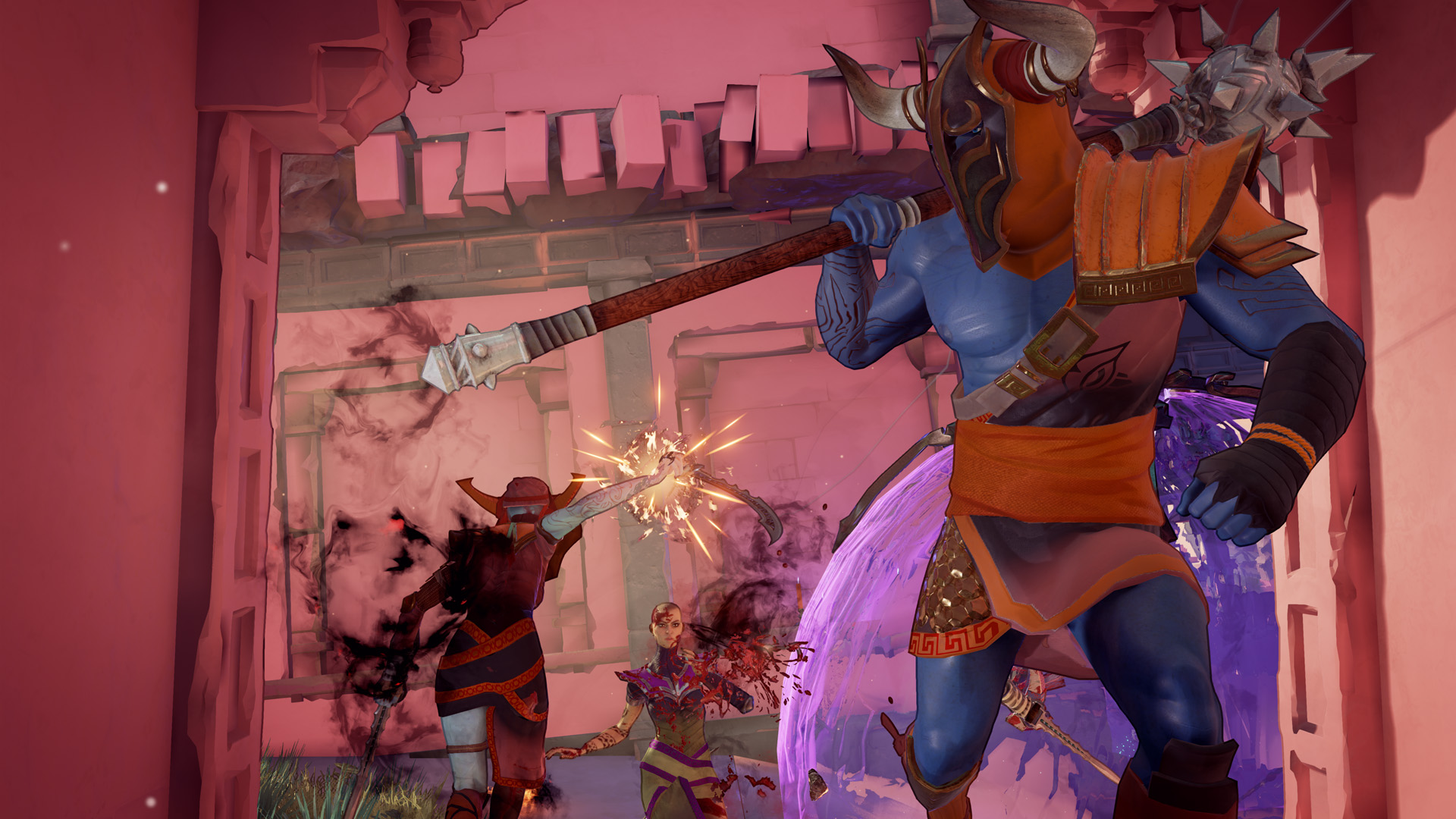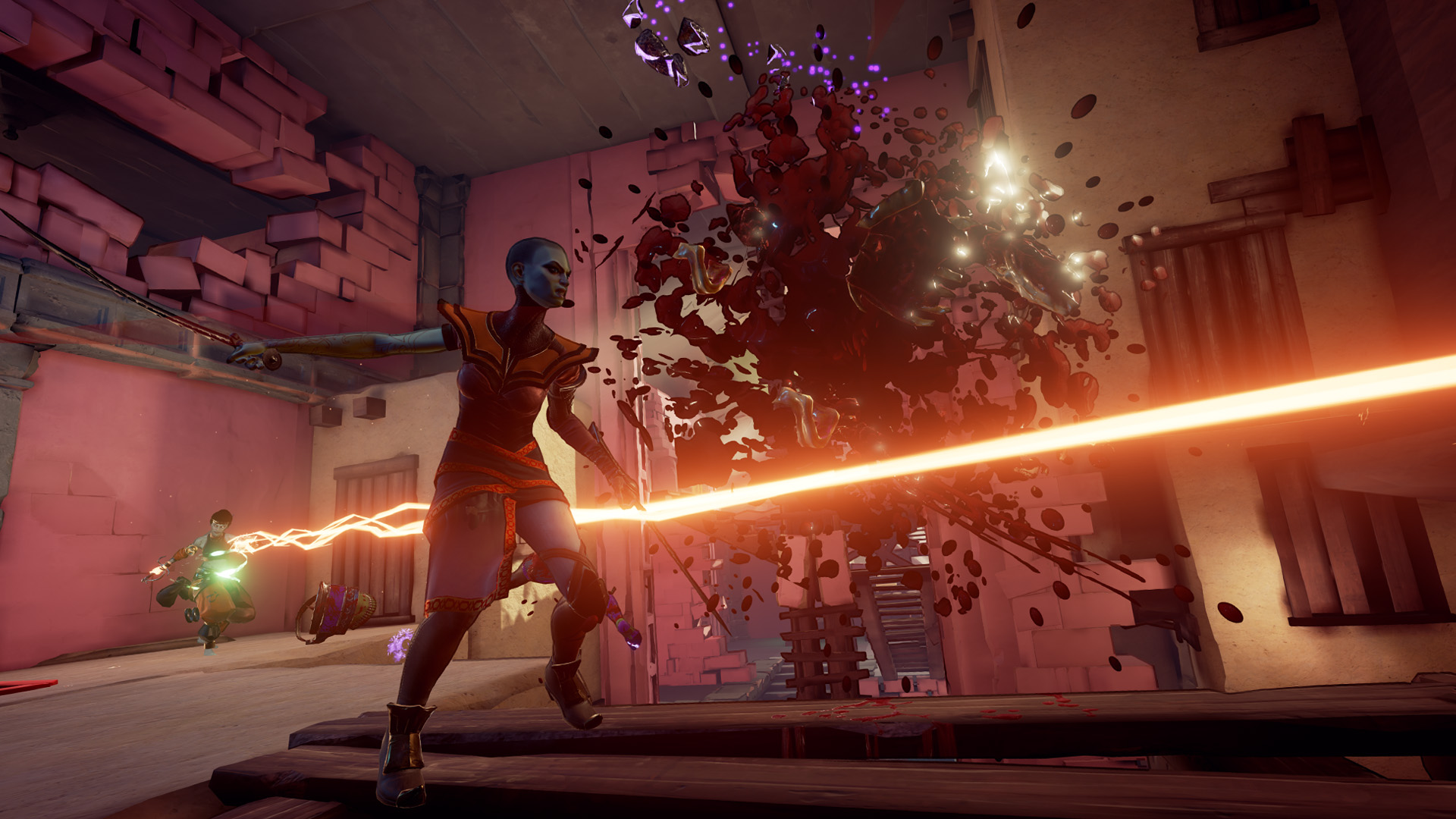An FPS that plays a little like Street Fighter

Mirage: Arcane Warfare is throwing its pointy wizard hat into 2016’s most crowded genre: the competitive multiplayer action thing. As the spiritual follow-up to Chivalry: Medieval Warfare, the 6-on-6, first-person magic ‘n’ melee game will compete with Overwatch, Battleborn, Paragon, (Gigantic?), LawBreakers, Paladins, and others. After seeing a hands-off demo of Mirage, there are two reasons I think it could stand out from that pack.
First: Mirage’s surreal, Arabian look is original. Blue-skinned minotaurs swing decapitating maces in ornate marble palaces; nimble mages hurl exploding geometry. Compared to the potpourri of sci-fi gorillas contained in the above, Mirage is more grounded in brutality. It’s a serious but elegant look, somewhere between Zeno Clash and Chivalry—not whimsical but with plenty of body-crumpling ragdoll to lighten the mood.
Second: Mirage seems committed to being itself. From what I’ve seen this is a genuine spiritual successor to Chivalry, and not something that will blend in a bunch of recent trends. Mirage has zero MOBA DNA: the two maps I saw featured straightforward, capture-point or payload-style attack and defend formats, with a focus on individual combat rather than peripheral stuff like lanes or map infrastructure. And comparable to Chivalry, Torn Banner plans on pricing it at $30.
If anything, Mirage is getting inspiration from fighting games.
There’s plenty of projectile magic in Mirage, for example, but these spells operate more like ‘moves’ than weapons. Think of Mirage’s magic the way you’d think of a fireball Street Fighter—highly readable attacks that you have to dodge or deflect. Not all of Mirage’s six classes will have blocking abilities, but those that do will be able to block any spell—just like, say, Chun-Li or Blanka can shrug off Guile’s Sonic Boom.
“We wanted to design the magic combat directly integrated with the melee so it felt like a swordfight from 20 feet away, if that makes sense,” says Steve Piggott, president at Torn Banner. “It’s exchange-based combat, where if you block something, you get the initiative, which means your next attack will come faster.”
I see this concept in action when the Alchemancer, one of Mirage’s classes, hurls what looks like a magical, wireframe icosahedron. It arcs toward the target, tumbling at medium speed toward someone on the opposite team. But that character, a Vigilist, throws out an arcane shield, a translucent blue bulwark that streaks ahead of her, colliding with the Alemancer’s spell and cancelling it. With the spell on cooldown, he’s free to close the distance on the enemy and jab away with his spear.
Keep up to date with the most important stories and the best deals, as picked by the PC Gamer team.
Later on, I see an assassin character, the Vypress, execute another kind of block. She negates a projectile by using a ‘Phase’ spell, which she can use to clip through characters or projectiles. However, it’s only effective for a second or two, giving her a narrow window for success. You can block with your melee weapon too, but Torn Banner clarifies that it isn’t an action you’ll be able to use without penalty. “A character's ‘block strength’ can be weakened over time, like a stamina gauge, at which point blocking fails and they become vulnerable to attacks. Other classes can evade spells or attacks instead of blocking,” says Alex Hayter, senior brand manager.

There’s plenty of Mirage that I haven’t seen, but most of the ranged stuff seems to have a purposeful heaviness that I like. Coupled with casting animations that telegraph your action, Mirage’s magic leaves room for defenders to react. You can see it in the way this spell animates in the trailer, too: a magma-sphere manifests over the Taurant’s head, spikes protrude outward, and then it’s hurled overhead.
I also admire that Torn Banner is showing confidence in the ideas it put forward in Chivalry. The melee system from that game is very much in tact, as is the gory but goofy dismemberment, decapitation, and character voice-over. Beside that, the imaginative (yet still functional) art and level design instills Mirage's ideas with vibrancy. The former mod team has been working on Mirage for two years, and it’ll go into beta in the late spring or early summer before releasing this year.

Evan's a hardcore FPS enthusiast who joined PC Gamer in 2008. After an era spent publishing reviews, news, and cover features, he now oversees editorial operations for PC Gamer worldwide, including setting policy, training, and editing stories written by the wider team. His most-played FPSes are CS:GO, Team Fortress 2, Team Fortress Classic, Rainbow Six Siege, and Arma 2. His first multiplayer FPS was Quake 2, played on serial LAN in his uncle's basement, the ideal conditions for instilling a lifelong fondness for fragging. Evan also leads production of the PC Gaming Show, the annual E3 showcase event dedicated to PC gaming.

